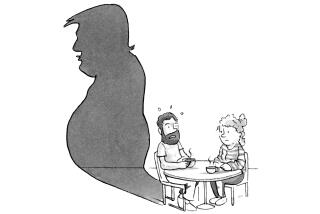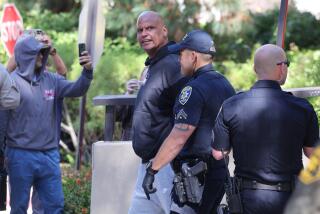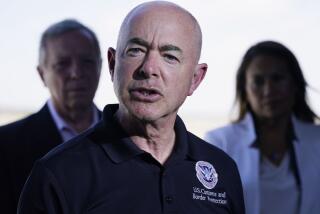A Foreign Reporter Gets a Story of U.S. Paranoia
- Share via
As I boarded my flight from London to Los Angeles on May 3, I looked forward to my first California experience. I had a freelance assignment for a British newspaper but also had been offered a bit of sightseeing by friends during my six-day stay. Instead, I spent 26 hours as a detainee. My only view of the city was framed by the metal bars on the security van transporting me, in handcuffs, from LAX to a downtown detention facility.
Inadvertently, I had arrived on American soil as a foreign journalist without a press visa, a requirement that has been on the books for years but is actually being enforced now under the strict guidelines of the Department of Homeland Security. I was traveling on my British passport and believed that, like most visitors from countries included in the U.S. “visa-waiver program,” I could still come in and go out easily without special paperwork. I was unaware that since March 2003 (when the Department of Homeland Security was created) the United States had begun to regard journalists from friendly countries as hostile aliens. Our intentions must be closely scrutinized before we are allowed to do our jobs.
What sort of country is afraid of the foreign press? I had plenty of time to ponder this during my disturbing, humiliating and deeply disappointing encounter with a United States that seems to have become a travesty of the country I love. (Only countries like Cuba, Syria, Iran and North Korea demand that journalists apply for special visas.)
If I had announced myself as a tourist at passport control, I would have been waved through. By declaring honestly that I was a journalist (as I had done on previous visits), I had become a suspect persona non grata. As I explained my situation to various officials, I was sure that my innocent mistake based on my (and my paper’s) ignorance of the still-obscure visa requirement would soon be clarified. After all, I had come from Britain, a staunch ally. Could I possibly be denied entry?
Incredibly, I was. And from the moment the decision to deport me was made, I was treated like a dangerous criminal without any basic rights. I was groped and searched. I was fingerprinted; mug shots were taken. Then, with my hands handcuffed behind my back -- a particularly painful and demeaning method -- I was taken through the airport to a van. Walking handcuffed among free LAX passengers was an indescribably strange experience; more than anything, it brought home the Kafkaesque fact that I was now a prisoner.
Later, I was to spend the night in a “detention tank” behind a thick glass wall, without a chair or bed. It contained only two steel benches, about 15 inches wide, a steel toilet and sink (all in full view of anyone passing by and of the camera observing all), a glaring neon light and a Big Brother-controlled television playing a shopping (!) channel all night. I found it hard to breathe in this human fish tank, yet knocking on the glass, repeatedly, brought no help. When a security officer finally walked by and I shouted through the door that I felt unwell, he wasn’t interested.
In the morning, I was transferred (again in handcuffs) back to a security room, where I spent the rest of the day awaiting my evening flight back to London. I and two other detainees, whom I was not permitted to talk to, were supervised the entire time by eight sleepy, TV-watching security officers. While they ate their breakfasts, I had to ask four times for food and was shouted at before something edible was brought to me, paid for with my own money.
I later found out that mine is not the only such case: In 2003, 12 journalists were detained and deported at LAX, and one at another U.S. airport, according to Reporters Without Borders. As a detainee, I was not allowed a pen. But it is not hard to remember what I saw: a glimpse of a country hiding its deep sense of insecurity behind an abusive facade, and an arbitrary (though not unintentional) disrespect for civil liberties. Nevertheless, I am applying for a journalist’s visa so I can come back and, I hope, see another America. May 3, as it happens, was World Press Freedom Day.
*
Elena Lappin is a British journalist.
More to Read
Sign up for The Wild
We’ll help you find the best places to hike, bike and run, as well as the perfect silent spots for meditation and yoga.
You may occasionally receive promotional content from the Los Angeles Times.






